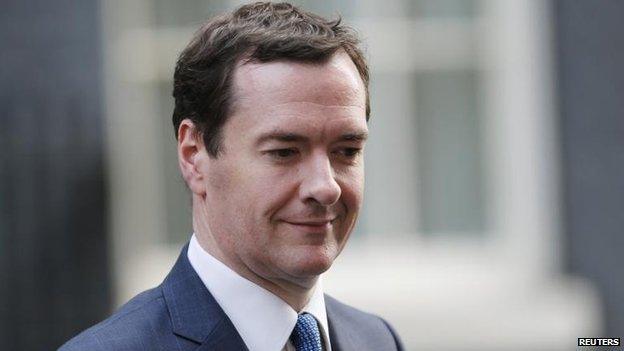Is the chancellor tempting fate?
- Published
- comments

If most of us could borrow money at 4% interest, and would never have to repay it, we would be pretty happy.
But not so George Osborne. Because on Friday he announced he would redeem £218m of a so-called consolidated loan - a class of gilt-edged stock commonly known as Consols - which were issued in 1927 by his undistinguished (at the Treasury) predecessor, Winston Churchill.
The Treasury has had the option to repay or redeem the loan since 1957, according to the original prospectus terms.
But it has never done so, because 4% interest looked very good value for taxpayers.
So why is the chancellor paying off the loan now?
Well it is because - as I assume you know - the interest rate the government currently has to pay is exceptionally and amazingly low.
I wrote about this recently in a column about how investors are placing bets that the long term growth prospects for the UK and other big rich economies are lacklustre at best, and why they are prepared to lend colossal sums to the supposedly safe-as-houses government at rates of interest that don't match the rate of inflation.
Here is one measure of these extraordinary market conditions. Last Tuesday the Debt Management Office, which borrows on behalf of HM Treasury, sold £4bn of a loan that doesn't have to be repaid till 2068 and on this loan it is paying an interest rate, or yield, of 2.966%.
In other words, it is borrowing for 54 years at an interest rate of less than 3%.
Now the last time the interest rate paid by the government was almost as low as this when issuing gilts or borrowing for such a long period was in August 1937, 34 years before George Osborne was born.
And the Debt Management Office has no record of ever having paid a lower rate of interest when selling a loan of that kind of ultra-long maturity.
So of course there is logic to the chancellor repaying the perpetual loan, the Consols, on which he pays a 33% higher rate of interest of 4%.
That looks like smart business for taxpayers.
But is he tempting fate in the decision to repay?
Chancellors should not be superstitious, I suppose. But some might wonder whether in deciding to repay a loan which never has to be repaid, and on which he pays an interest rate that looks low by all historical standards, he is shouting to the gods of the markets that they have created an unsustainable bubble.
And if the bubble is ever to be pricked, might this not be the moment dictated by what some would see as Treasury hubris?